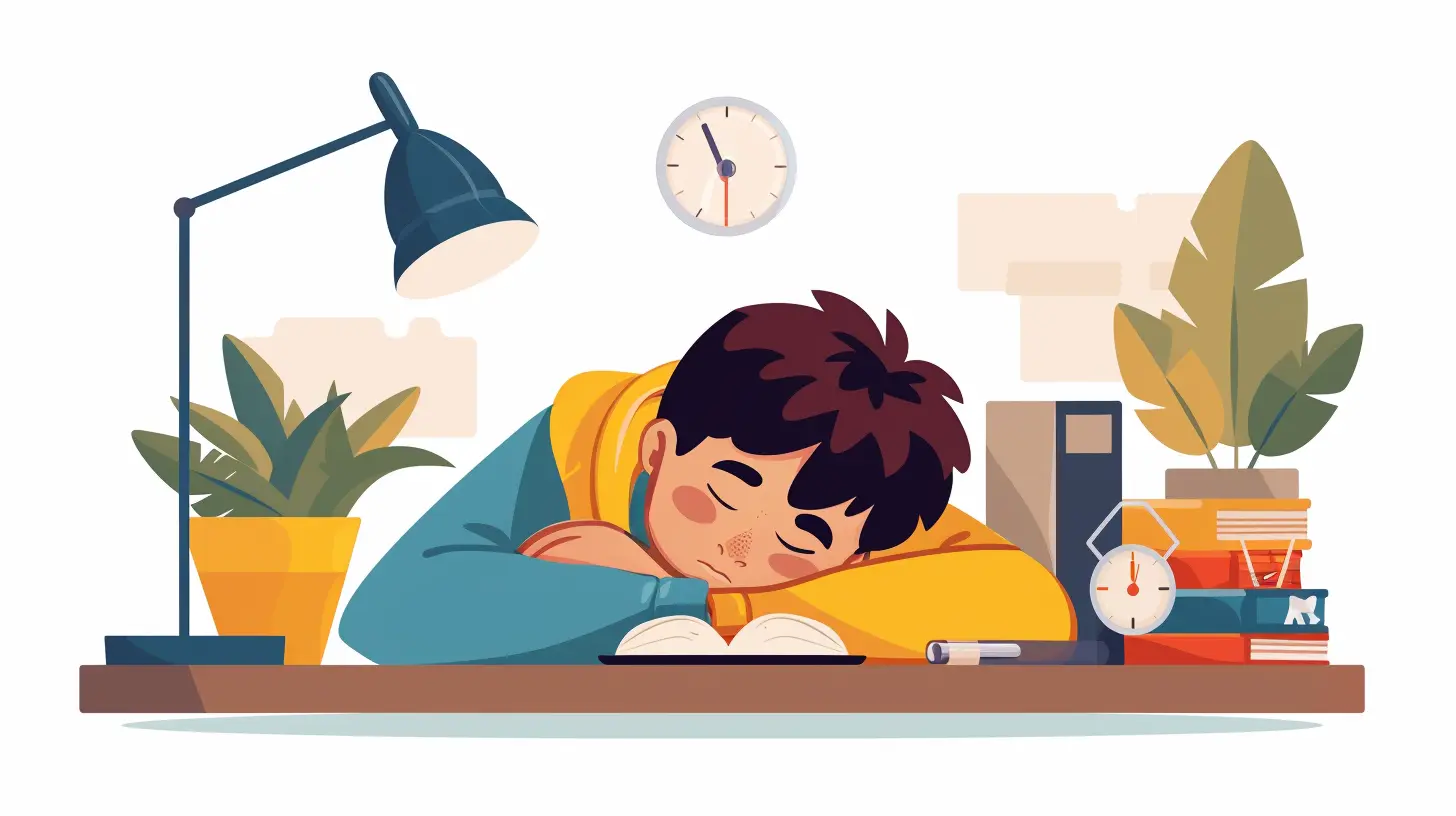The Link Between Sleep and Homework Performance
26 November 2024
When it comes to school success, most students and parents focus on study habits, time management, or even tutoring. But here's something that often gets overlooked: sleep. Yep, that thing we all wish we had more of. You might be wondering, “What does sleep have to do with homework?” Well, a lot more than you might think. Research shows that the amount and quality of sleep a student gets can directly impact their ability to focus, retain information, and, ultimately, perform well on homework. Let’s dive into the connection between sleep and homework performance, and why catching Z’s might just be as important as hitting the books.

Why Sleep is a Big Deal for Students
Sleep and the Brain: A Power Duo
We know that sleep is important for everyone, but for students, it’s absolutely essential. Think of your brain like a smartphone. Throughout the day, your brain is running multiple apps — from learning new material in class to processing emotions and managing stress. Just like your phone needs to be recharged, your brain needs sleep to function at its best. Without enough sleep, your brain’s battery runs low, and it struggles to operate efficiently, making it harder to think, concentrate, and remember things.The Science Behind Sleep and Memory
One of the most fascinating aspects of sleep is its role in memory consolidation. Ever notice how after a good night’s sleep, things you learned the day before seem to “stick” better? That’s because while you sleep, your brain is busy sorting through all the information you gathered during the day, deciding what to keep and what to toss away. This process is crucial for retaining what you’ve studied, which is why pulling an all-nighter and cramming isn’t the best way to prepare for a test. Sleep is the unsung hero in making sure that algebra formula or historical date actually stays in your brain.How Sleep Impacts Focus and Attention
Let’s be real: homework requires focus. Whether you're solving math problems or writing an essay, you need to be able to concentrate. Lack of sleep makes this difficult. When you're sleep-deprived, your brain struggles to stay on task, making even simple homework assignments feel like climbing a mountain. It’s like trying to drive a car with low fuel — you can still go, but not very far.When you’re well-rested, on the other hand, tasks that seemed difficult the night before suddenly become more manageable. You can think more clearly, work faster, and make fewer mistakes. In fact, studies have shown that students who get enough sleep perform better academically than those who consistently don’t.

The Downward Spiral of Sleep Deprivation
What Happens When You Don’t Get Enough Sleep?
Ever tried to write an essay or solve a tricky math problem after a bad night’s sleep? It’s not fun. Lack of sleep can lead to cognitive impairment, meaning your brain just doesn’t work as well. You may experience:- Poor concentration: It’s harder to focus on tasks, and you're more likely to get distracted.
- Slower processing: Your brain takes longer to understand and process information, which means your homework takes longer to complete.
- Memory lapses: You won’t retain information as well, making it harder to recall facts and concepts you need for your assignments.
- Irritability and mood swings: Sleep deprivation can make you cranky, and let’s face it, it’s hard to put your best foot forward on homework when you're in a bad mood.
The Vicious Cycle: Sleep, Homework, Repeat
Here’s where it gets tricky. When students don’t get enough sleep, they struggle with homework. This often leads to spending more time on assignments, which means they stay up later. And what happens then? They don’t get enough sleep again the next night. It’s a vicious cycle. The more sleep-deprived you are, the harder homework becomes, and the harder homework becomes, the less sleep you get. Ouch.Breaking this cycle is key to improving both sleep quality and homework performance.

How Much Sleep Do Students Really Need?
Sleep Recommendations by Age
The amount of sleep a student needs varies by age, but here’s a basic guideline:- Elementary school students: 9-11 hours per night
- Middle school students: 9-10 hours per night
- High school students: 8-10 hours per night
- College students: 7-9 hours per night
Notice how even high school and college students need a significant amount of sleep? It’s not just for toddlers! But we get it — between extracurriculars, social life, and homework, finding time for sleep can feel impossible.
The Reality for Students
Let’s be honest. Most students aren’t getting the recommended amount of sleep. According to the CDC, about 7 out of 10 high school students don’t get enough sleep on school nights. And it’s not just high schoolers — college students are notorious for pulling all-nighters. But even missing out on just an hour or two of sleep can have a noticeable impact on homework performance.
Tips for Balancing Sleep and Homework
1. Create a Homework Routine
One of the best ways to ensure you have enough time for both homework and sleep is to create a routine. Set aside a specific time each day for homework, and stick to it. This will help prevent last-minute cramming sessions that cut into your sleep time.2. Break Big Tasks into Smaller Chunks
Got a big project or long essay to write? Don’t wait until the night before it’s due. Break it down into smaller tasks and tackle one part each day. Not only will this make the workload more manageable, but it will also keep your stress levels in check, allowing for better sleep.3. Avoid Caffeine Late in the Day
It’s tempting to reach for a cup of coffee or energy drink to power through an afternoon homework session. But caffeine can stay in your system for hours, making it harder to fall asleep at night. Stick to water or herbal tea if you need a refreshment.4. Create a Sleep-Friendly Environment
Your bedroom should be a place where you can relax and unwind. Keep it cool, dark, and quiet. Consider using earplugs or a white noise machine if outside noises disrupt your sleep. And yes, this means putting away your phone and other electronics at least 30 minutes before bed. The blue light from screens can interfere with your body’s natural sleep cycle.5. Don’t Procrastinate
Procrastination is the enemy of both sleep and homework. The longer you put off assignments, the more likely you are to end up staying up late to finish them. Try to tackle homework as soon as you can after school. The sooner you start, the sooner you finish, and the more time you’ll have for sleep.The Role of Parents and Teachers in Encouraging Good Sleep
What Can Parents Do?
Parents can play a key role in helping their children develop healthy sleep habits. Encourage a consistent bedtime routine, limit screen time before bed, and make sure your child’s room is conducive to sleep. If your child is struggling with homework, work with them to create a plan that allows for both productivity and downtime.How Can Teachers Help?
Teachers can also help by being mindful of the amount of homework they assign. Overloading students with hours of homework can lead to sleep deprivation, which ultimately impacts their performance in the classroom. Teachers can encourage better time management skills and emphasize the importance of sleep for academic success.
Wrapping It Up: Sleep is the Secret Ingredient
It’s clear that sleep and homework performance are closely linked. Without enough sleep, students struggle to concentrate, retain information, and complete assignments effectively. But by prioritizing sleep and developing good study habits, students can improve both their homework performance and overall well-being. So the next time you're feeling overwhelmed by homework, remember — sometimes the best thing you can do is get a good night’s sleep.all images in this post were generated using AI tools
Category:
Homework HelpAuthor:

Fiona McFarlin
Discussion
rate this article
18 comments
Jasmine Elliott
Great insights! Sleep truly impacts academic performance and success.
February 2, 2025 at 9:46 PM

Fiona McFarlin
Thank you! I'm glad you found the insights valuable. Sleep plays a crucial role in enhancing academic success.
Jolene McGrady
Great article! It’s fascinating to see how sleep impacts our homework performance. Prioritizing rest could really boost our learning outcomes!
January 28, 2025 at 8:35 PM

Fiona McFarlin
Thank you! I'm glad you found it insightful. Prioritizing sleep is indeed key to enhancing learning!
Zayla Hayes
Ever tried studying for a pop quiz in a dream? Turns out, our brains might prefer pillow talk over textbooks! If counting sheep boosts your homework game, then let’s start a sleep study group—snacks included, of course. Good sleep is the ultimate cheat code for academic success! Zzz-mazing!
January 24, 2025 at 6:02 AM

Fiona McFarlin
Absolutely! Quality sleep is essential for optimal academic performance, and your idea of a sleep study group sounds both fun and beneficial. Snacks and good rest can definitely help boost our learning potential! Zzz-mazing indeed!
Jonah Martinez
Sleep: the secret ingredient for homework success! Who knew that napping could be your brain's best study buddy? Snooze to win! 😴📚
January 19, 2025 at 9:05 PM

Fiona McFarlin
Absolutely! Sleep is crucial for memory retention and cognitive function, making it a key player in academic success. Napping can really enhance focus and performance! 😴📚
Caden Garcia
Fascinating! It’s intriguing how sleep quality may impact homework performance. I’d love to explore strategies to optimize both.
January 16, 2025 at 1:10 PM

Fiona McFarlin
Thank you! Optimizing sleep quality can indeed enhance homework performance. Strategies like establishing a consistent sleep schedule, creating a restful environment, and managing screen time can be beneficial. Let's explore these together!
Adam Palmer
Sleep significantly enhances cognitive function, boosting homework performance and retention.
January 12, 2025 at 11:36 AM

Fiona McFarlin
Absolutely! Sleep is crucial for cognitive processes, leading to better focus, memory retention, and overall homework performance.
Jack Pacheco
Ever wondered why some students excel while others struggle? Delve into the enigma of sleep's hidden influence on homework performance. As we unravel the intricate web connecting rest and academic success, prepare for surprising revelations that could reshape your understanding of learning and achievement. Sleep is more powerful than you think.
January 5, 2025 at 1:52 PM

Fiona McFarlin
Thank you for your insightful comment! Sleep undeniably plays a crucial role in cognitive function and academic performance, and understanding this connection can indeed transform our approach to learning.
Isabella Mahoney
Fascinating insight! I wonder how sleep quality varies among students and affects their homework efficiency.
January 3, 2025 at 4:44 AM

Fiona McFarlin
Thank you! Sleep quality can significantly impact students' focus and retention, ultimately influencing their homework efficiency. Further research on this topic could provide valuable insights.
Pierce McMichael
This article effectively highlights the crucial connection between sleep and academic performance. It’s a reminder that prioritizing rest can enhance our focus and productivity in completing homework. Students and educators should acknowledge the importance of a well-balanced schedule for optimal learning outcomes. Great insights!
December 30, 2024 at 8:35 PM

Fiona McFarlin
Thank you for your thoughtful comment! I'm glad you found the insights valuable. Prioritizing sleep is indeed essential for maximizing academic success.
Imani McMillen
What a delightful read! Understanding the vital connection between sleep and homework performance is truly eye-opening. Prioritizing restful sleep can significantly boost our learning and productivity. Here’s to cozy nights, energized mornings, and achieving academic success! Keep up the fantastic work in spreading such important insights! 🌟📚✨
December 26, 2024 at 8:25 PM

Fiona McFarlin
Thank you so much for your kind words! I'm glad you found the insights valuable. Here's to better sleep and brighter academic outcomes! 🌙📖
Camille McGuire
Sleep well, succeed in school!" 💤✨
December 23, 2024 at 3:43 AM

Fiona McFarlin
Thank you! Sleep is indeed crucial for academic success! 💤✨
Presley McNulty
In the quiet cocoon of night, Dreams weave wisdom, take flight. Sleep, a gentle guide we seek, Transforms the weary into the meek. Homework blooms in rested minds, Where clarity and focus intertwines. So let the stars embrace your head, For bright tomorrows, sleep well instead.
December 12, 2024 at 10:06 PM

Fiona McFarlin
Thank you for your beautiful words! Sleep truly is essential for enhancing our cognitive function and homework performance.
Nix McFadden
Great article! It’s so important to recognize how sleep impacts our learning. Prioritizing rest can enhance homework performance and overall well-being. Let’s encourage students to develop healthy sleep habits for better academic success! Keep sharing valuable insights!
December 11, 2024 at 1:26 PM

Fiona McFarlin
Thank you for your thoughtful comment! I completely agree—prioritizing sleep is essential for academic success and overall well-being. Let's keep spreading the message!
John Benson
Rest fuels success; prioritize sleep for better learning!
December 7, 2024 at 3:59 AM

Fiona McFarlin
Absolutely! Prioritizing sleep is essential for optimizing learning and academic performance, as it enhances focus, memory, and overall cognitive function. Thank you for highlighting this important connection!
Sara McGrady
This article highlights the critical connection between sleep quality and homework performance. It’s essential for students to prioritize adequate rest to enhance focus, retention, and overall academic success, emphasizing that sleep should be as valued as study time.
December 1, 2024 at 3:43 AM

Fiona McFarlin
Thank you for your insightful comment! I completely agree that prioritizing sleep is vital for academic success and retention.
Alexia Hayes
Snooze wins, grades zoom!
November 28, 2024 at 12:42 PM

Fiona McFarlin
Thank you! Sleep is indeed crucial for optimal academic performance.
Zephyrine Alexander
Oh sure, because who wouldn’t want to stay up cramming for that math test instead of getting a good night's sleep? Clearly, sleep deprivation is the secret ingredient for academic success. Why bother with rest when you can have caffeine-fueled chaos?
November 27, 2024 at 11:28 AM

Fiona McFarlin
I understand your frustration! However, research shows that adequate sleep actually enhances memory and learning, making it crucial for academic success. Balancing study time with rest is key.
Elwynn Gilbert
Quality sleep is essential for optimal cognitive function and academic success. Prioritizing rest not only enhances homework performance but also fosters emotional well-being, encouraging a balanced approach to education that values health as much as achievement.
November 26, 2024 at 8:03 PM

Fiona McFarlin
Absolutely! Prioritizing sleep is crucial for enhancing cognitive abilities and emotional health, ultimately leading to better homework performance and academic success.
MORE POSTS

How to Use Online Tutoring for Homework Support

Blended Learning for English Language Learners

How Civic Education Encourages Lifelong Learning and Civic Engagement

How to Create a Homeschooling Portfolio for Record-Keeping

Teaching Civic Education in a Multicultural Society

How Civic Education Promotes Inclusivity and Tolerance

Using Field Trips to Enrich Your Homeschool Curriculum

The Power of Improv in Developing Student Creativity

Strategies for Fostering Effective Group Collaboration in the Classroom

Staying Motivated in Your Teaching Career

Blended Learning in K-12: Strategies for Teachers and Schools